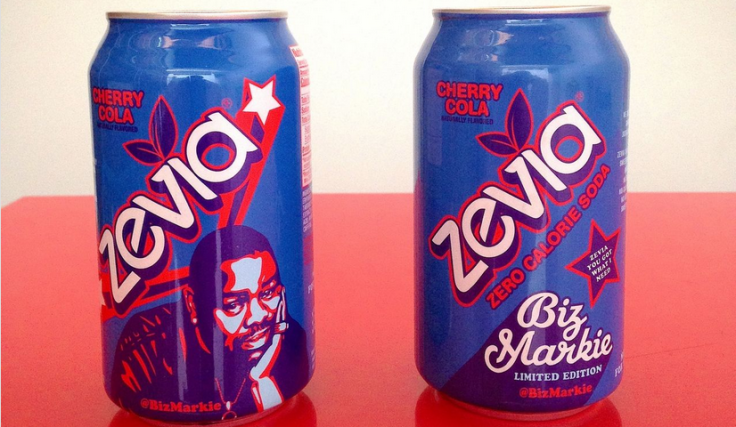Fancy Sodas, Coffee And Energy Drinks Gain As Traditional Soft Drinks Lose

Traditional sodas like Coca-Cola and Pepsi are losing popularity, but it's not because consumers are trying to cut back on sugar. Sweetened drinks—including those with real, cane sugar—are having a heyday as Americans increasingly guzzle a growing selection of energy drinks, coffee concoctions and fancy fizzy beverages.
The latest evidence of the nation’s sugar rush comes from the 19 percent quarterly rise in Starbucks' profit, reported Thursday. The Seattle-based coffee chain reported sales of $4.18 billion, up 10 percent from $3.8 billion in the year-earlier period, as demand for coffee, especially the sweetened, flavored varieties, keeps rising.
While Coca-Cola and PepsiCo report falling soda sales, Starbucks has rolled out a line of handcrafted soda sweetened with cane sugar. The coffee company’s Fizzio sodas include a root beer spiced with nutmeg, cinnamon, clove and star anise.
“Two overriding consumer trends are for variety and healthy refreshment,” said Gary Hemphill, managing director of research for industry researcher Beverage Marketing Corporation. “Variety-seeking consumers continue to drink their share of carbonated soft drinks, but they also are moving to diversify their beverage selections.”
Beverage buyers seem increasingly interested in possible health benefits of natural sugar substitutes and the organic, artisanal feel to sodas made from raw cane sugar and plants like stevia. The trends point to an avoidance of high fructose corn syrup and artificial sweeteners like aspartame, which is used in many diet sodas.
According to Beverage Marketing Corporation, carbonated soft drinks are the nation’s largest beverage category, representing more than 40 percent of the industry’s volume. The segment is dominated by traditional high-calorie sodas, but it continues to contract, slipping by 1 percent in the first half of 2014 compared to the same period last year. Meanwhile, bottled and sparkling water, ready-to-drink coffee, and energy drinks are the fastest-growing drink categories in the U.S. this year.
Coffee climbed 8.3 percent in the first half of this year, followed by bottled water (7.5 percent), energy drinks (6.3 percent), sports drinks (3.2 percent) and ready-to-drink tea (2.3 percent). Many of these drinks are sweetened.
Even the fastest-growing alcoholic drink in the U.S. has a touch of sweetness. Although hard cider is a mere 1 percent of the U.S. beer market, it has exploded in growth since 2009. Analysts predict that by 2015, Angry Orchard cider will account for a fifth of sales volume for its parent Boston Beer Co., the maker of Samuel Adams beers.
According to the Centers for Disease Control and Prevention, the portion of young American consumers who drink one can of soda daily has fallen for the past seven years. And sweetened coffee and tea, sports drinks and energy drinks are gaining market share where soda is losing. It’s a share of the market Sparkling ICE, maker of lightly carbonated waters, lemonades and teas, is capitalizing on.
“Cola is the steak and potatoes of the beverage industry, but people want refreshment and flavor,” said Kevin Klock, CEO of Talking Rain Beverage Company, the maker of Sparkling ICE zero-calorie lightly carbonated waters, lemonades and teas.
The fastest-growing beverage brand in the U.S. for the past three years, Sparkling ICE contains sucrolose, an artificial sweetener, but the drink is marketed like a natural drink. Sparkling ICE is projected by Wells Fargo to become the beverage industry’s next billion-dollar brand in revenue by 2018. The private company says its sales will end the year at about $500 million.
The drinks sell in clear, slim, 17 oz. plastic bottles to showcase brightly colored liquids and pictures of the fruit it’s imitating laid over an ice cube. The brand’s newest line, launched last month, is flavored, lightly carbonated and caffeinated teas like peach tea.
But sugar alternative soda-makers are quick to point out they aren’t making health claims.
“We’re focused on refreshment, and if we meet a consumer’s health needs, great,” Klock said. “If you make health claims, you’re asking for someone to challenge it.”
“We’re certainly healthier than soda,” he added.
Another fast-growing zero-calorie soda brand, Zevia, ran billboard ads in 2012 in support of Michael Bloomberg’s proposed soda ban across New York City. But aside from promoting itself in natural food stores as a kosher, gluten-free and vegan soda option, Zevia doesn’t claim health benefits either.
Paddy Spence, Zevia’s CEO, calls the drink "a natural alternative. We provide the consumer an option,” he said.
© Copyright IBTimes 2025. All rights reserved.






















